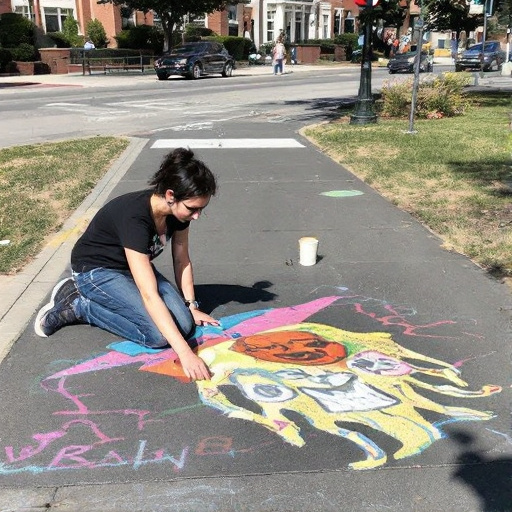Featured Articles
- "Chalk Art and Activism: How Campus Sidewalks Became a Canvas for Expression and Outrage"
- Quiet Quitting: The Unseen Impact of Minimalist Student Engagement on Campus Life Dynamics
- The Forgotten Art of Dining Hall Cuisine: A Culinary Exploration of Campus Life's Hidden Delights
- The Secret Life of Campus Pets: Uncovering the Furry Friends Behind Student Success Stories
- Top 6 Innovative Backpacks for Campus Life Revolutionizing Student Organization and Comfort Since 2019
When AI Meets Campus Life: Navigating the Future of Study Buddies and Robot Roommates
When AI Meets Campus Life: Navigating the Future of Study Buddies and Robot Roommates
The integration of artificial intelligence (AI) into campus life is transforming the way students learn, socialize, and navigate their daily routines. From AI-driven study buddies to robot roommates, the future of college experience is becoming increasingly tech-savvy and interconnected.
The Rise of AI Study Buddies
Picture this: you're sitting in a bustling café on campus, textbooks strewn around you, and you're struggling to focus on your studies. Enter your AI study buddy—a virtual assistant designed to enhance your academic performance. With algorithms that adapt to your learning style, this digital companion helps create personalized study plans, suggests resources, and even quizzes you on key concepts.
According to a report by Educause, more than 60% of college students believe AI tools significantly contribute to their academic success. Universities are harnessing this potential by integrating AI-driven educational platforms that tailor learning experiences. For instance, Carnegie Mellon University has developed an AI tutor that provides instant feedback and support, changing how students grasp complex subjects.
A Study in Progress
Let’s delve into a case study at the University of Michigan, where a pilot program has been implemented using a personalized AI study buddy. Students involved reported a 25% increase in their grades during the semester following their use of the AI tool. They expressed how the AI's tailored feedback made them feel more engaged. "It’s like having a mentor who's never too busy to help," one student remarked.
Meet Your Robot Roommate
Now, let’s talk about robot roommates. You may think this is the stuff of sci-fi movies, but the reality is becoming strikingly close. Imagine waking up to an android that not only reminds you of your morning classes but also prepares your favorite breakfast and sets your playlist to help you start your day off on a positive note.
Currently, dorms are experimenting with robots that manage various tasks. These robots can perform chores, remind students of important deadlines, and even facilitate social interactions. For example, at the University of Southern California, a pilot program includes implementing robots that can retrieve packages, reducing the amount of time students spend on mundane tasks. Students joke that their robots are now their "very efficient best friends."
The Lighthearted Side of DAO (Droid Assisted Organization)
Having a robot roommate isn’t just practical; it’s also pretty amusing. Imagine returning to your dorm to find your AI roommate in a mad scramble trying to keep your clothes off the floor while simultaneously arguing with your digital assistant about what constitutes a “mess.” The potential for comedic moments and storytelling here is endless! "Can you believe I had to teach my roommate how to fold a shirt?" one student laughed. It’s not just utility; it’s about creating stories and experiences.
The Balancing Act: AI Benefits vs. Privacy Concerns
While the advantages of AI in campus life are enthralling, we must also address the elephant in the room—privacy concerns. With the use of AI, students’ data is being constantly collected and analyzed to enhance learning experiences. This raises questions about data safety and student privacy, especially regarding personal information.
A study by the American Association of University Professors found that 42% of faculty members have concerns about the ethical implications of AI in education. Many universities are implementing strict guidelines to ensure data confidentiality. Ensuring that students are fully informed about their data usage is crucial for maintaining trust between institutions and their students.
Best Practices for Students
Students can safeguard their data by being informed participants in the digital realm. Here are a few tips:
- Review your institution's data policies regularly.
- Utilize software privacy settings.
- Stay educated about the AI tools you are using and their data collection practices.
The Stakes of Human Connection
In a tech-dominated world, the value of human connections cannot be overstated. The key challenge is ensuring that while students embrace AI technologies, they also invest time in building genuine relationships. How often will you choose a robot conversation over spending time with a friend? It’s a dynamic interplay—one that could balance advantages and potential pitfalls.
The Future of Learning Environments
The evolution of campus life is unfolding rapidly, with AI embedded into our educational landscape. The potential implications are staggering; studies consistently demonstrate that collaboration with AI can lead to improved academic outcomes. Research indicates that AI-powered programs drive retention rates up by as much as 30%, fostering environments in which students feel more supported both academically and socially.
However, integrating AI technologies must complement the traditional educational framework rather than replace it. Collaborative projects, group studies, and social interactions are pivotal for personal growth. In the words of technology theorist Sherry Turkle, “We expect more from technology and less from each other.” Ensuring that students don’t forego face-to-face interaction for a digital alternative is vital.
Breaking Down Barriers
If we rewind to when the internet first came into play, many feared it would take away the essence of human interaction. Fast forward to today, and it’s essential to recognize that while technology was initially daunting, it ultimately transformed how we connect. Similarly, the AI revolution requires a shift in perspective. Instead of viewing AI as a barrier to connection, we can embrace it as a bridge to foster collaboration and newfound relations among students.
Case Study: AI Innovations in Education
Let's take a step back and examine a broader trend: AI's effect on global classes. For example, the University of Pennsylvania is exploring AI to enhance online education. Enrollment in online courses has skyrocketed—by over 200% in many cases—due to AI-driven personalization in learning paths. The outcomes show that students are more likely to engage, succeed, and retain information when the learning experience is tailored to suit their needs.
Is It All Fun and Games?
Bringing humor back into the conversation, one can only imagine the debates that arise when two AI roommates have a disagreement over what movie to watch on movie night. “I believe the data suggests ‘The Matrix’ is more relatable to your college experience,” one might say while the other robot, with a pinpoint sarcasm, replies, "Or maybe living in a computer simulation isn’t what I signed up for.” While these interactions may be fictional for now, the potential for humor in daily life with AI is immense.
The Gentle Transition to Tech-Savvy Campuses
As we transition into this AI-infused reality, it's important to maintain a gradual approach. Universities can roll out such technologies in phases, ensuring that students and faculty have time to adapt. Combining human-led initiatives with AI solutions can lead to enriched learning experiences without overwhelming stakeholders.
A student at MIT captured this sentiment perfectly: "It’s a balancing act. I love my AI study buddy, but sometimes, I just need to cry over a failed exam with my friends." This emotion is shared with the broader student community navigating their way through academic and personal challenges.
The Last Word: A New Era of Learning
As students across the globe step into a new era characterized by AI innovations, they are met with an exciting blend of opportunity and challenge. The prospect of having study buddies that know your strengths and weaknesses could transform how we approach education. Concurrently, robot roommates may save time and foster a sense of companionship in the increasingly solitary atmosphere of dormitory life.
Ultimately, the goal must be a thoughtfully curated experience in which AI enhances student life, not detracts from it. Continuous feedback loops between students and institutions will be essential as we pave the way for this brave new world. So let’s embrace both our AI study buddies and our robot roommates, while also ensuring we prioritize the human connections that ground our campus life.




